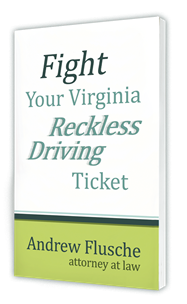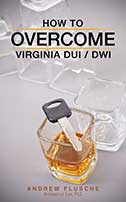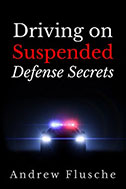How to Read Speedometer Calibrations
Speedometer calibrations can be great tools for speeding and reckless driving defense. However, you need to know what to look for on the calibration report. Don’t go into court unprepared.
Transcription
I’ve had this video transcribed for visitors who prefer to read the content.
Hello, I’m Andrew Flusche. Today I wanted to talk a little bit more about speedometer calibrations. They’re such a crucial part in some reckless driving and speeding cases here in Virginia. And they’re often misunderstood as to what it is and how it works.
The basic way, as I’ve explained before, that it works is you go to a shop that does these; you don’t normally take it to your regular auto dealer. You take it to a shop that does speedometer calibrations and they put the car on what is called a dynamometer. That’s a machine that runs the car at designated speeds. They put the wheels on this machine and they run the machine, and that runs the wheels of the vehicle at whatever speeds they want. Once the car is running at the speed designated by the machine, the mechanics then read the speedometer and see what it’s showing and they note any difference. So they’ll give you a report that shows at 10, 20, 30, 40 miles an hour and so on, the comparison of the machine’s known speed versus the speed reading on your speedometer.
That report is the crucial part of the speedometer calibration because that’s what we need to take to court to show the judge to show if there was any discrepancy in the calibration of your speedometer. But the key thing that so many people misunderstand (even lawyers), I’ve heard from mechanics who do these calibrations and lawyers who go to court that do not understand how read the calibration reports and know if it’s actually going to help the case. You can’t just take any calibration report into court and say “I got my speedometer calibrated judge, so that means I’m not guilty.” That’s not at all the case.
The calibration is a tool that we’re trying to show, hopefully, that your speedometer was reading lower than the speed that your vehicle was actually going. So if you look at your report you’ll see the known speeds of the dynamometer versus the speedometer reading. What we want to look for is a reading that shows that your speedometer number is lower than the known speed of the dynamometer. So what that would tell the judge is that if you’re charged with, let’s say, 85 miles an hour, and if your speedometer at 85 mph would have only been reading 82 or 80, then that would mean that you didn’t know you were going 85 mph; your speedometer essentially lied to you. And since, unless you know otherwise, you’re entitled to rely on your speedometer; that’s why they’re there, so we can know how fast we’re going and know if we’re speeding or not. Since you’re entitled to rely on that the judge normally will consider that calibration and in some form, depending on the judge and the court, give you credit for that and reduce the charge by however much your speedometer was reading low.
But that’s the key thing: your speedometer needs to be reading low. If your speedometer is reading higher than the actual speed of the vehicle–so let’s say that at 85 mph for the dynamometer your speedometer was reading 88–that would mean that you’re reading 3 miles higher than the speed that you’re charged with, which would mean that if the trooper is correct that he clocked you at 85, your speedometer would’ve been reading 88 mph. So that would mean that you thought you were going even faster than the claim by the trooper. So that’s not going to help us at all.
In fact, I don’t know that many judges would hold it against you, but some judges might. At least in the back of their minds, they think “Well you thought you were going even faster than the trooper says .” So that’s a calibration report that we don’t want to take into court; we want to keep that to ourselves. And we can; it’s our evidence, and we don’t have to use it if it’s not helpful to us.
Now, if your speedometer is dead-on–if you get it calibrated and it shows that at 85 your speedometer is reading exactly 85–then I don’t see any purpose to bringing it to court, but it won’t hurt you necessarily. In fact the judge might appreciate that you spent a little money and you’re trying to figure out if there is a problem with your vehicle or not. I don’t see any purpose in bringing it and I don’t normally for my clients but that’s something you could feel free to do and I don’t think it would hurt you in court.
But that’s the key thing: you need to make sure that your speedometer calibration is actually helpful and definitely not hurtful. No offense to them, they are very great guys, but I would not trust the word of the mechanic who does the calibration. They have a great job to do and they help us out a lot with doing these calibrations, but they’re not in court and they’re not attorneys. And I wouldn’t trust the word of your friend or cousin or whoever else has done this; you need to talk with an attorney who does traffic defense regularly and who knows how to read calibration reports and the different kinds that we get and the different formats that the shops put them in, so you make sure that your calibration is actually helpful before you take it in front of the judge and show the judge this great calibration that could actually hurt your case if you’re not careful.
So in sum, calibrations are great and I recommend them in a lot of cases, but before you take it to court, you need to make sure that it actually helps your case. The best way to do that is to talk with an attorney after you get the calibration done. Definitely talk with someone ahead of time, and we can usually recommend local shops to do the calibration and then once you get it done, give me a call back and we can talk about the results and how it might affect the case.




